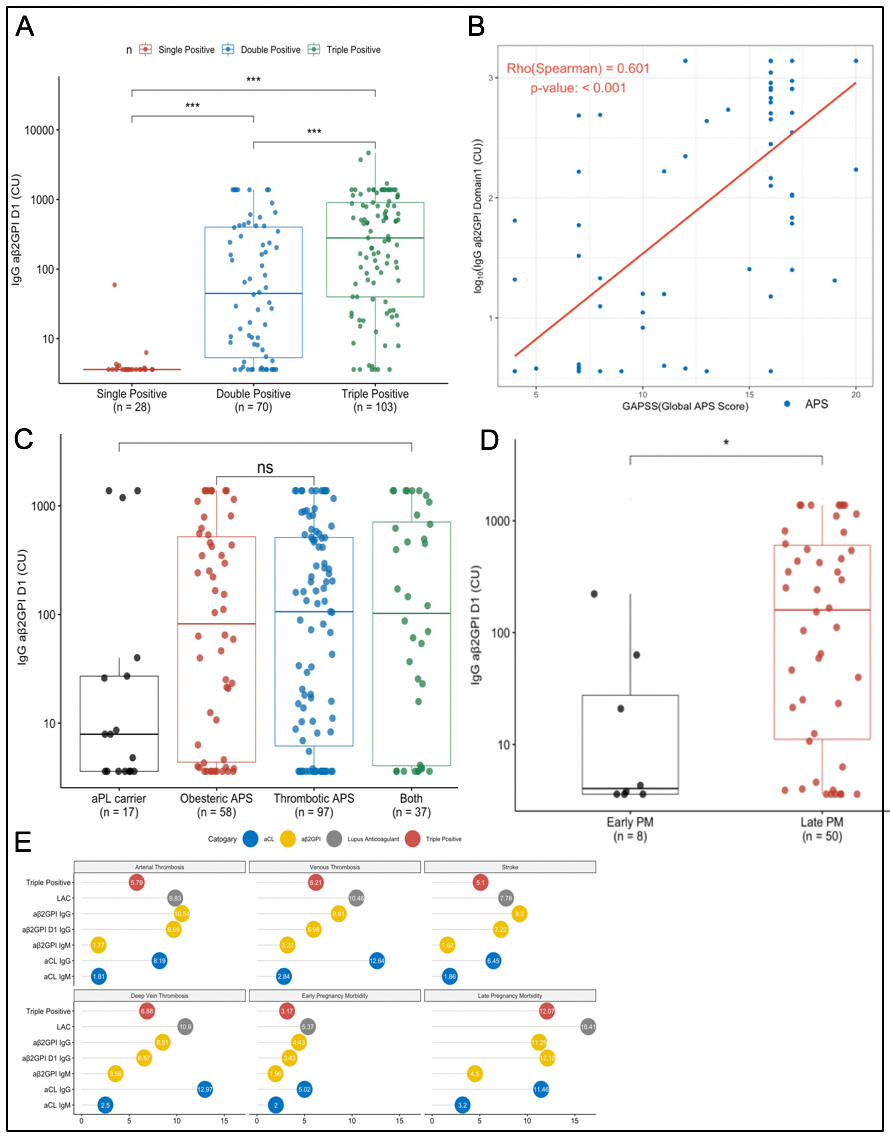Session Information
Session Type: Poster Session (Sunday)
Session Time: 9:00AM-11:00AM
Background/Purpose: Anti-β2GPI-Domain 1 (β2GPI -D1) antibodies are currently considered to be a pathogenic subset of anti-β2GPI antibodies and have been strongly associated with thrombosis and pregnancy morbidity in antiphospholipid syndrome (APS) patients. We evaluated the clinical utility of anti-β2GPI-D1 IgG antibody for stratifying the risk of thrombosis and/or pregnancy morbidity (PM) in a cohort of Chinese patients with APS and also assessed its correlation with the Global Anti-Phospholipid Syndrome Score (GAPSS).
Methods: Sera from 192 APS patients, 17 aPL carriers, 193 patients with other systemic autoimmune diseases, and 120 healthy controls were collected and the presence of aCL IgG/IgM, anti-β2GPI IgG/IgM antibodies and anti-β2GPI-D1 IgG were assessed by chemiluminescence assays (CIA). Anti-phosphatidylserine-prothrombin (aPS/PT) IgG and IgM antibodies were detected by commercial ELISA kits.
Results: Anti-β2GPI-D1 IgG antibodies showed high specificity (97.12%) and moderate sensitivity (64.32%) for the diagnosis of APS. Anti-β2GPI-D1 antibody levels were significantly higher in patients with triple aPL positivity and correlated well with the GAPSS. Anti-β2GPI-D1 antibody presented with a higher prevalence and higher titers in patients with late pregnancy morbidity (≥10 wks) and thrombosis compared to those with early pregnancy (< 10 wks) morbidity. Higher anti-β2GP1-D1 antibody titers effectively distinguished APS from other autoimmune diseases. Conclusion: This study suggests a predictive role of anti-β2GPI-D1 IgG antibodies as a strong risk factor for both thrombotic and obstetric APS (OAPS), especially for late adverse pregnancy outcomes.
To cite this abstract in AMA style:
Liu T, Gu J, Wan L, Norman G, Shi H, Yang C. Anti-β2GPI Domain 1 Antibodies Stratify High Risk of Thrombosis and Pregnancy Morbidity in a Large Cohort of Chinese Patients with Antiphospholipid Syndrome [abstract]. Arthritis Rheumatol. 2019; 71 (suppl 10). https://acrabstracts.org/abstract/anti-%ce%b22gpi-domain-1-antibodies-stratify-high-risk-of-thrombosis-and-pregnancy-morbidity-in-a-large-cohort-of-chinese-patients-with-antiphospholipid-syndrome/. Accessed .« Back to 2019 ACR/ARP Annual Meeting
ACR Meeting Abstracts - https://acrabstracts.org/abstract/anti-%ce%b22gpi-domain-1-antibodies-stratify-high-risk-of-thrombosis-and-pregnancy-morbidity-in-a-large-cohort-of-chinese-patients-with-antiphospholipid-syndrome/

